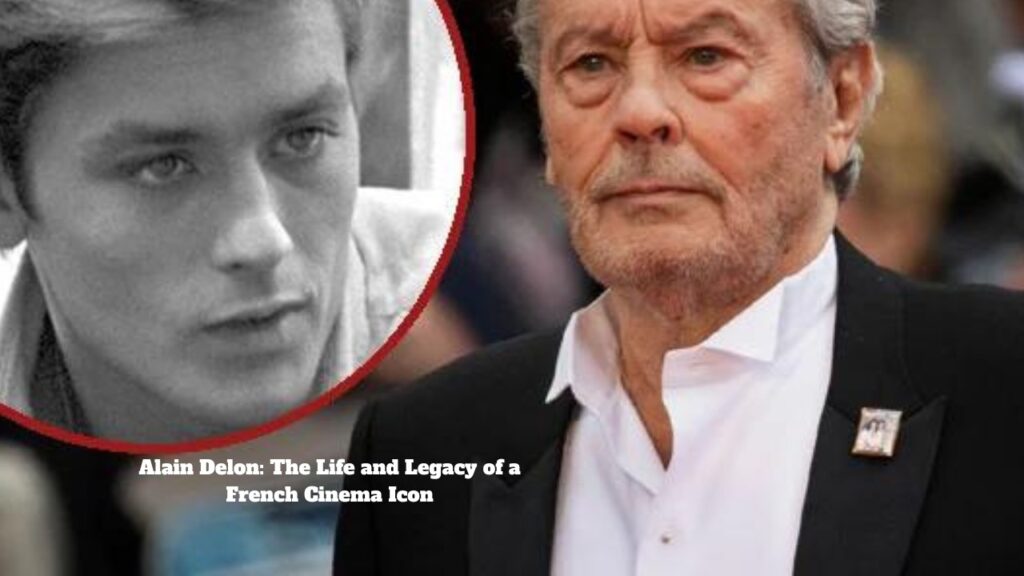French screen star Alain Delon dies aged 88 today. The world of cinema has lost one of its most legendary figures with the passing of Alain Delon at the age of 88. The French actor, known for his striking looks, enigmatic screen presence, and powerful performances, was a central figure in European cinema for over five decades. From his breakout roles in the 1960s to his status as a cultural icon, Delon’s influence on film and popular culture is undeniable. This article explores the life, career, and enduring legacy of Alain Delon, reflecting on how he became one of the most revered actors in cinematic history.
Table of Contents
ToggleEarly Life and Career Beginnings
Alain Delon’s Childhood and Early Years
Alain Delon was born on November 8, 1935, in Sceaux, a suburb of Paris, France. His early life was marked by turbulence; his parents divorced when he was just four years old, and Delon spent much of his childhood moving between foster homes and boarding schools. Despite these challenges, Delon developed an interest in cinema from a young age, drawn to the glamour and allure of the silver screen.
Delon’s initial path was far from the world of acting. After a brief stint in the French Navy, where he served in Indochina, Delon returned to France with no clear direction. It was during this period that his striking looks caught the attention of people in the film industry, leading to his first foray into acting.
Breakthrough in French Cinema
Delon’s film career began in earnest in the late 1950s. His good looks and natural charisma quickly made him a sought-after talent in French cinema. His first significant role came in 1958 with “Quand la femme s’en mêle” (When the Woman Meddles), directed by Yves Allégret. This marked the beginning of a meteoric rise in the French film industry.
Delon’s breakthrough role, however, came with “Plein Soleil” (Purple Noon) in 1960, directed by René Clément. Based on Patricia Highsmith’s novel “The Talented Mr. Ripley”, Delon played the role of Tom Ripley, a young American who becomes embroiled in a web of deceit and murder. His performance was widely acclaimed, establishing him as a leading actor in European cinema.
Rise to International Stardom
Iconic Roles in the 1960s
The 1960s were a defining decade for Alain Delon, as he transitioned from a rising star to an international icon. His collaboration with director Luchino Visconti in “Rocco e i suoi fratelli” (Rocco and His Brothers) in 1960 further cemented his status as a serious actor. Delon’s portrayal of Rocco, a young man caught between family loyalty and personal ambition, was a critical success and showcased his range and depth as an actor.
In 1963, Delon starred in “Leopardo” (The Leopard), another collaboration with Visconti. The film, set during the Risorgimento in Italy, is considered one of the greatest historical epics in cinema. Delon’s role as Tancredi, the charming and ambitious nephew of the aristocratic protagonist played by Burt Lancaster, earned him international acclaim.
Delon continued to build on his success with films like “L’Éclipse” (The Eclipse) by Michelangelo Antonioni in 1962 and “Le Samouraï” in 1967, directed by Jean-Pierre Melville. In “Le Samouraï”, Delon’s portrayal of Jef Costello, a solitary and enigmatic hitman, became one of his most iconic roles. The film’s minimalist style and Delon’s cool, detached performance influenced a generation of filmmakers and actors.
Hollywood and International Recognition
Although Alain Delon was primarily associated with French and Italian cinema, his fame extended far beyond Europe. In the 1960s and 1970s, Delon made several forays into Hollywood, working with prominent directors and actors. His international appeal was bolstered by his fluency in multiple languages and his ability to adapt to different cinematic styles.
One of Delon’s notable Hollywood roles was in “The Yellow Rolls-Royce” (1964), a star-studded ensemble film that also featured Rex Harrison, Ingrid Bergman, and Shirley MacLaine. Delon’s charm and screen presence were on full display, further enhancing his reputation as a global star.
Despite his success in Hollywood, Delon remained deeply connected to European cinema, often returning to France and Italy to work on projects that were closer to his artistic sensibilities. His versatility as an actor allowed him to move seamlessly between different film industries while maintaining his unique identity.
Alain Delon’s Cinematic Style and Influence
The Delon Persona: Cool, Detached, and Enigmatic
Alain Delon’s cinematic persona is characterized by a cool, detached demeanor, often portraying characters who are mysterious, morally ambiguous, and emotionally restrained. This persona was epitomized in films like “Le Samouraï”, where Delon’s portrayal of a lone hitman with a strict code of honor left a lasting impression on audiences and critics alike.
Delon’s characters were often anti-heroes, men who operated on the fringes of society and adhered to their own set of rules. Whether playing a hitman, a thief, or a lover, Delon brought a sense of gravitas and intensity to his roles that made him stand out in every performance. His ability to convey complex emotions with minimal dialogue and understated expressions became a hallmark of his acting style.
Collaborations with Renowned Directors
Throughout his career, Alain Delon collaborated with some of the most celebrated directors in cinema, each of whom recognized and utilized his unique talents in different ways. His work with Jean-Pierre Melville, in particular, is often cited as among the most influential in his career. Films like “Le Samouraï” and “Le Cercle Rouge” (1970) are considered masterpieces of French cinema and have influenced countless filmmakers.
Delon’s collaborations with Italian director Luchino Visconti also stand out as high points in his career. Visconti’s films, known for their opulent visuals and deep psychological insights, provided Delon with roles that allowed him to explore the complexities of human nature. Delon’s performances in “Rocco e i suoi fratelli” and “Leopardo” are among the most critically acclaimed of his career.
Influence on Modern Cinema
Alain Delon’s influence on modern cinema is profound. His style and screen presence have inspired generations of actors and directors, particularly in the realm of film noir and crime dramas. Delon’s portrayal of morally ambiguous characters with a cool, detached demeanor can be seen in the work of actors like Ryan Gosling in “Drive” (2011) and Keanu Reeves in the “John Wick” series.
Directors such as Quentin Tarantino and Martin Scorsese have cited Delon’s work as an inspiration for their own films. The visual and thematic elements of Delon’s films, particularly those directed by Melville, continue to resonate in contemporary cinema, where the anti-hero archetype remains a powerful and popular figure.
Personal Life and Public Persona
Romantic Relationships and Family
Alain Delon’s personal life was as much in the spotlight as his professional career. Known for his relationships with some of the most beautiful and famous women in the world, Delon’s love life was the subject of intense media scrutiny. His high-profile relationships included romances with actresses Romy Schneider and Nathalie Delon, the latter of whom he married in 1964. The couple had a son, Anthony Delon, who would go on to become an actor in his own right.
Delon’s relationship with Romy Schneider, whom he met on the set of “Christine” in 1958, was one of the most talked-about love stories in the history of French cinema. Although their relationship ended in 1963, they remained close, and Schneider’s tragic death in 1982 had a profound impact on Delon.
Controversies and Legal Issues
Despite his success, Alain Delon’s life was not without controversy. He was often portrayed in the media as a complex and sometimes difficult figure. His connections to the criminal underworld, particularly in the 1960s and 1970s, were a source of speculation and scandal. Delon was linked to the notorious “French Connection” drug smuggling ring, although he was never formally charged with any wrongdoing.
In addition to these controversies, Delon was involved in several legal disputes throughout his life, including a highly publicized paternity suit in the 1960s and various business-related conflicts. Despite these challenges, Delon maintained his status as a beloved figure in French cinema, with his personal life adding to the mystique that surrounded him.
Political Views and Public Statements
Alain Delon was known for his outspoken views, particularly on matters of politics and society. Throughout his life, he expressed strong opinions on issues ranging from immigration to
the state of the French film industry. Delon was often criticized for his controversial statements, which sometimes aligned with far-right ideologies.
Despite the backlash, Delon remained unapologetic about his views, often citing his love for France and his desire to protect its cultural heritage as the motivation behind his statements. His political views, combined with his enigmatic personality, made him a polarizing figure in the public eye, yet he continued to command respect and admiration from his fans.
Alain Delon’s Later Years and Legacy
Transitioning Away from Acting
As Alain Delon aged, he gradually stepped away from the limelight, taking on fewer roles and focusing on his personal life and business ventures. His last major film role was in “Asterix at the Olympic Games” (2008), where he played Julius Caesar in a comedic performance that showcased his enduring charisma. Although his appearances became less frequent, Delon’s influence on cinema remained strong, with many of his earlier films being rediscovered and celebrated by new audiences.
In his later years, Delon received numerous awards and honors, including an honorary Palme d’Or at the Cannes Film Festival in 2019. The award recognized his contributions to cinema and his status as one of France’s greatest actors. Delon’s acceptance speech was emotional, reflecting on his long career and the impact he had made on the world of film.
Health Struggles and Public Appearances
In the years leading up to his death, Alain Delon faced significant health challenges, including a stroke in 2019 that left him with mobility issues. Despite these struggles, he continued to make public appearances, often using these opportunities to connect with his fans and reflect on his legacy.
Delon’s health issues also led him to make the decision to retire from acting officially. In his final interviews, he spoke candidly about his life, his regrets, and his hopes for how he would be remembered. Delon’s passing at the age of 88 marks the end of an era in French cinema, but his legacy will undoubtedly endure.
Legacy and Impact on French Cinema
Alain Delon’s impact on French cinema is immeasurable. He was not only a talented actor but also a cultural icon who defined an era of filmmaking. His influence can be seen in the work of countless actors, directors, and filmmakers who followed in his footsteps.
Delon’s films continue to be celebrated for their artistry and for the complex, nuanced performances he brought to the screen. Whether playing a tormented hero, a charming rogue, or a cold-blooded killer, Delon’s ability to convey the inner workings of his characters made him one of the most compelling actors of his generation.
FAQs
What were some of Alain Delon’s most famous films?
Some of Alain Delon’s most famous films include “Plein Soleil” (Purple Noon), “Le Samouraï”, “Leopard”, and “Rocco e i suoi fratelli”. These films are considered classics of French and Italian cinema.
Did Alain Delon ever work in Hollywood?
Yes, Alain Delon appeared in several Hollywood films, including “The Yellow Rolls-Royce” and “Texas Across the River”. However, he remained primarily associated with European cinema.
What was Alain Delon’s relationship with Romy Schneider?
Alain Delon and Romy Schneider were romantically involved in the late 1950s and early 1960s. They met on the set of “Christine” and became one of the most famous couples in European cinema, though they eventually separated.
How did Alain Delon influence modern cinema?
Alain Delon’s cool, enigmatic screen persona and his roles in film noir and crime dramas have influenced a wide range of actors and filmmakers, including contemporary directors like Quentin Tarantino and Martin Scorsese.
What were Alain Delon’s political views?
Alain Delon was known for his outspoken political views, which often aligned with conservative and far-right ideologies. His statements on immigration and French culture were particularly controversial.
How will Alain Delon be remembered?
Alain Delon will be remembered as one of the greatest actors in French cinema history, a cultural icon whose influence extended far beyond the screen. His legacy will continue to inspire future generations of filmmakers and actors.
Conclusion
Alain Delon’s death marks the end of a remarkable era in cinema. With his passing, the world has lost not just an actor but a symbol of a bygone era of film. Delon’s legacy, however, lives on through his films, his influence on modern cinema, and the enduring impact he had on audiences around the world. As we reflect on his life and career, Alain Delon remains an icon whose contributions to cinema will never be forgotten.



